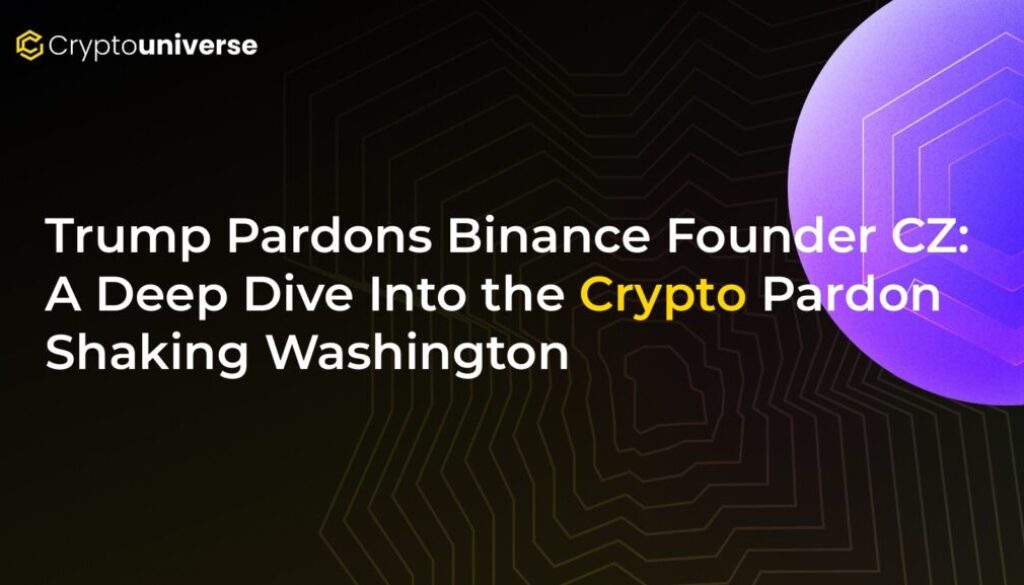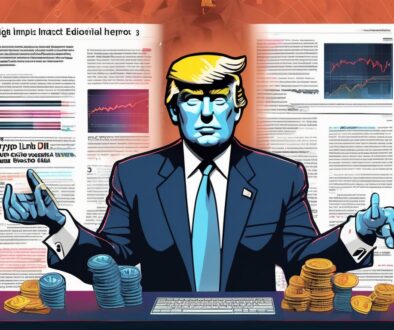Trump Pardons Binance Founder CZ: A Deep Dive Into the Crypto Pardon Shaking Washington

A Presidential Pardon Rocks the Crypto World
In a move that has sent shockwaves through both the cryptocurrency industry and Washington D.C., President Donald Trump has issued a full pardon to Changpeng Zhao, the founder of the world’s largest cryptocurrency exchange, Binance. Zhao, widely known as CZ, pleaded guilty to significant anti-money laundering violations in 2023, making this decision one of the most controversial pardons in recent memory.
The White House has framed the move as the end of a political crusade. Press Secretary Karoline Leavitt declared that “the war on cryptocurrency is over,” arguing that the sentence imposed on Zhao was disproportionate and had “severely damaged the United States’ reputation as a global leader in technology and innovation.”
President Trump himself suggested Zhao was a victim of political persecution. “A lot of people say he wasn’t guilty of anything,” Trump stated. “I don’t know him… but I’ve been told he had a lot of support, and they said that what he did is not even a crime. It wasn’t a crime that he was persecuted by the Biden administration, and so I gave him a pardon at the request of a lot of very good people.”
Background Check: The Multi-Billion Dollar Case Against Binance
To understand the gravity of the pardon, it’s crucial to revisit why Changpeng Zhao was facing prison time. In November 2023, the Department of Justice reached a landmark plea agreement with both Zhao and Binance. The exchange paid over $4 billion in fines for violating anti-money-laundering (AML) and sanctions laws.
The evidence was damning. Prosecutors revealed internal communications showing a deliberate disregard for legal compliance. In one exchange, Binance’s chief compliance officer admitted that some customers were, “Like come on. They are here for crime.” A colleague bluntly replied, “We see the bad, but we close 2 eyes.”
At the time of the settlement, then-Treasury Secretary Janet Yellen stated that Binance’s “willful failures allowed money to flow to terrorists, cybercriminals, and child abusers through its platform.” Despite resigning as CEO, Zhao reportedly still holds a majority stake in the company he founded.
Following the Money: The Trump Family, a Stablecoin, and Binance
While the official White House narrative focuses on ending a “war on crypto,” a complex web of financial dealings raises serious questions about a potential conflict of interest. The story centers around a crypto business majority-owned by the Trump family, World Liberty Financial (W.L.F.), and its proprietary stablecoin, USD1.
Here’s a breakdown of the key events:
- The Stablecoin Launch: W.L.F. launched its USD1 stablecoin, aiming to compete with established players like Tether (USDT) and Circle (USDC).
- The Binance Connection: To gain traction, USD1 needed adoption. It received a massive boost when Binance agreed to accept a $2 billion investment from MGX, a fund controlled by the U.A.E. government. Crucially, this transaction was settled entirely in W.L.F.’s USD1 stablecoin.
- The Impact: This single deal caused the circulation of USD1 to skyrocket by 15-fold overnight. It also sent a surge of capital to W.L.F., which could then invest the reserves backing the stablecoin in U.S. Treasuries, generating an estimated $80 million a year in returns for the Trump-family company.
Reports also suggest Binance’s involvement went deeper, with some sources claiming the exchange helped write the basic code for USD1 and promoted its adoption through PancakeSwap, a trading platform created by developers with ties to Binance.
“Pay-to-Play Corruption”: The Political Firestorm
The pardon has ignited a political firestorm on Capitol Hill, with critics calling it a blatant example of corruption. Representative Maxine Waters, the top Democrat on the House Financial Services Committee, described the pardon as a “payoff and a blatant example of the kind of pay-to-play corruption that Trump and his Administration continue to engage in.”
This pardon is part of a broader pattern of clemency for controversial figures in the crypto space. President Trump previously freed Ross Ulbricht, founder of the dark web marketplace Silk Road, and pardoned founders of the BitMEX exchange who also pleaded guilty to AML violations. However, the direct financial ties between the Trump family’s business and Binance place the CZ pardon in a different category entirely.
What This Means for the Future of Crypto
The pardon of Changpeng Zhao is more than just one man’s legal victory; it’s a powerful signal to the entire digital asset industry. For some, it represents a pro-crypto stance from the highest office, suggesting a future with less regulatory hostility. For others, it raises alarming concerns that wealth and political connections can erase accountability for serious financial crimes.
As the dust settles, the crypto industry is left to wonder: Does this usher in a new era of innovation and freedom in the U.S., or does it risk turning the industry into a political battlefield where rules apply only to the unconnected? The answer will likely define the next chapter of cryptocurrency regulation in America.


